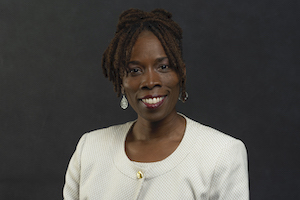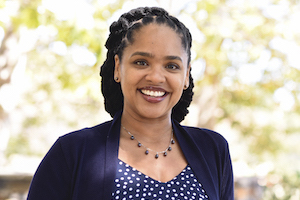Multidisciplinary Faculty Create Online Platform to Help Survivors of Intimate Partner Violence
Through the Pepperdine Cross-School Collaborative Research Program funded by the Office of the Provost, three University faculty members have partnered to create In Search of Sanctuary, a website dedicated to empowering victims and survivors of intimate partner violence while reshaping the discourse within faith groups. Launched in December 2020, the website was born from a partnership between Tanya Asim Cooper, associate clinical professor of law and director of Restoration and Justice Clinic at the Caruso School of Law, Thema Bryant-Davis (MDiv ’16), professor of psychology and director of the Culture and Trauma Research Lab at the Graduate School of Education and Psychology, and Roslyn M. Satchel, Blanche E. Seaver Professor of Communication at Seaver College.
 For years the professors had been working independently on projects related to intimate
partner abuse, with Asim Cooper and Satchel approaching it from a legal standpoint
and Bryant-Davis applying her perspectives as a mental health clinician and researcher.
After cohosting a pre-pandemic conference at the Malibu campus on ways churches can
better serve partner abuse survivors, the three faculty members’ plans to organize
additional speaking engagements together were put on hold due to COVID-19 safety measures.
During a time of heightened isolation, creating a website featuring the necessary
tools to help intimate partners survivors, like access to a free domestic abuse resource
directory, information on how to escape domestic abuse and unhealthy relationships,
and interfaith referrals for Jewish and Muslim communities, seemed like the ideal
solution to distributing this information. The group also partners with churches to
educate faith leaders on the signs, dangers, and appropriate responses to congregants
who confide in them about abuse they are facing at home.
For years the professors had been working independently on projects related to intimate
partner abuse, with Asim Cooper and Satchel approaching it from a legal standpoint
and Bryant-Davis applying her perspectives as a mental health clinician and researcher.
After cohosting a pre-pandemic conference at the Malibu campus on ways churches can
better serve partner abuse survivors, the three faculty members’ plans to organize
additional speaking engagements together were put on hold due to COVID-19 safety measures.
During a time of heightened isolation, creating a website featuring the necessary
tools to help intimate partners survivors, like access to a free domestic abuse resource
directory, information on how to escape domestic abuse and unhealthy relationships,
and interfaith referrals for Jewish and Muslim communities, seemed like the ideal
solution to distributing this information. The group also partners with churches to
educate faith leaders on the signs, dangers, and appropriate responses to congregants
who confide in them about abuse they are facing at home.
 According to the National Coalition Against Domestic Violence (NCADV), each year in
the United States more than 10 million men and women are physically abused by their
intimate partners, with women between the ages of 18–24 being the most commonly abused
population. NCADV also reveals that 25 percent of women and nearly 10 percent of men
experience severe intimate partner physical and sexual violence, resulting in injury,
sexually transmitted diseases, fearfulness, post-traumatic stress disorder, and use
of victim services. Of those injured, only 34 percent seek medical treatment.
According to the National Coalition Against Domestic Violence (NCADV), each year in
the United States more than 10 million men and women are physically abused by their
intimate partners, with women between the ages of 18–24 being the most commonly abused
population. NCADV also reveals that 25 percent of women and nearly 10 percent of men
experience severe intimate partner physical and sexual violence, resulting in injury,
sexually transmitted diseases, fearfulness, post-traumatic stress disorder, and use
of victim services. Of those injured, only 34 percent seek medical treatment.
“I say to survivors of abuse that your life is sacred, your safety matters, and your children’s safety matters,” shares Bryant-Davis, a licensed psychologist who, along with Satchel, is an ordained minister in the African Methodist Episcopal Church. “God does not blame or shame you for the violations you have endured, and his desire is for you to be in sanctuary, safety, love, and respect. There are people of faith who care about you and want to walk with you in love and compassion, not judgment or denial of your wounds.”
 With decades of research in the realm of intimate partner violence, Bryant-Davis notes
that while some victims report being harmed by messages from faith leaders, others
have revealed that their spiritual beliefs and faith communities helped them to survive,
escape, and restore their lives. “Faith communities can be a part of the solution
by recognizing the need for mental health for trauma recovery for victims and authentic
accountability and transformation for abusers,” she says.
With decades of research in the realm of intimate partner violence, Bryant-Davis notes
that while some victims report being harmed by messages from faith leaders, others
have revealed that their spiritual beliefs and faith communities helped them to survive,
escape, and restore their lives. “Faith communities can be a part of the solution
by recognizing the need for mental health for trauma recovery for victims and authentic
accountability and transformation for abusers,” she says.
Satchel, a scholar, researcher, and professor who has also served as a pastor, church elder, guardian ad litem, and policy advocate, has applied her legal expertise to represent girls and women—particularly those marginalized by caste, race, gender, socioeconomic status, ability, sexual orientation, immigration status, or violence—and fight for their best interests.
“Marginalized women are increasingly opting against calling the police in response to intimate partner violence, and many report going to faith communities and online platforms to seek help, especially since COVID-19 policies were implemented,” Satchel says.
Asim Cooper, who emphasizes that the website serves as an informational hub and is not intended for legal advice or counsel, wants those considering leaving an abusive relationship to know that there is hope. Together with her law students in the Restoration and Justice Clinic at the Caruso School of Law, she has represented many victims who seek help but feel torn because of the conflicting messages their faith leaders provide.
“Because faith leaders never formally learn about domestic violence or receive training on how to appropriately respond, often their default response is to save the relationship above all else.” Asim Cooper says. “Our collaboration aims to get the appropriate information, training, and resources that faith communities need in order to equip them to help victims of domestic violence.”